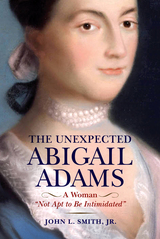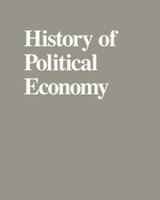
Contributors to this collection question whether biography is essential to understanding the history of economic ideas and consider how autobiographical materials should be read and interpreted by historians. Articles consider the treatment of autobiographical materials such as conversations and testimonies, the construction of heroes and villains, the relationship between scientific biography and literary biography, and concerns related to living subjects. Several essays address the role of biography and autobiography in the study of economists such as F. A. Hayek, Harry Johnson, Alfred Marshall, John Maynard Keynes, Oskar Morgenstern, and François Quesnay, concluding with several accounts of the interconnection of the historians’ projects with their own autobiographies.
All 2007 subscribers to History of Political Economy will receive a copy of “Economists’ Lives: Biography and Autobiography in the History of Economics” as part of their subscription.
Contributors
Roger E. Backhouse
Bruce Caldwell
Loïc Charles
William Coleman
Robert W. Dimand
Paul John Eakin
Ross B. Emmett
Evelyn L. Forget
Craufurd D. Goodwin
Peter Groenewegen
Malachi Haim Hacohen
Jan-Otmar Hesse
Patricia Laurence
Frederic S. Lee
Robert Leonard
Tiago Mata
D. E. Moggridge
Jeremy D. Popkin
Mike Reay
Christine Théré
E. Roy Weintraub

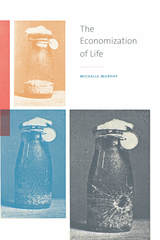

Economists and psychologists share an interest in explaining how people make the choices that they do. However, economists have tended to stress individual rationality, shaped by economic motives and expressed in formal logical or mathematical models, while psychologists have preferred to identify influences through experimentation. In recent decades, behavioral economics has bridged the two fields and challenged the traditional economic assumption that individuals choose rationally. The essays collected here provide a longer view and reflect on episodic contact between psychology and economics beginning in the late nineteenth century. They help explain why meaningful, sustained joint inquiry eluded both disciplines for so long and usefully complement the recent inclination of researchers in each field to find inadequacy in the other.
Contributors: Marina Bianchi, Simon J. Cook, Neil De Marchi, José Edwards, Tiziana Foresti, Craufurd D. Goodwin, Judy L. Klein, Harro Maas, Ivan Moscati, John Staddon, Andrej Svorenčík
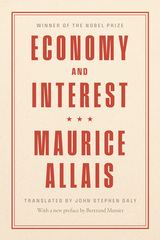
The essential work from the Nobel Prize-winning virtuoso of twentieth-century economics, translated to English for the first time.
Few scholars advanced the frontier of economic modeling more than French economist Maurice Allais. Allais’s contributions—beyond his famous Allais’s Paradox—earned him the Nobel Prize and drew comparisons to the works of Paul Samuelson and even some modern mathematical behavioral economists.
Allais’s accomplishments, however, went largely unread by non-Francophone readers due to the challenge of their translation for publishers. The effects of this gap are immeasurable. As Paul Samuelson wrote, “Had Allais's earliest writings been in English, a whole generation of economic theory would have taken a different course.”
Economy and Interest is the milestone translation of Allais's most influential work, one whose staggering findings predate their accepted formulations by other famed economists decades later. In its sweep and technical virtuosity, Economy and Interest is certain to delight and challenge new generations of English-language readers.
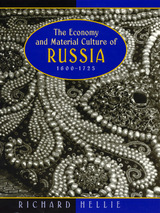
Impressive in scope and data analysis, Economy and Material Culture of Russia, 1600-1725 will be an invaluable resource and reference work for all readers interested in economic history and the history of material culture. Since there is no comparable one-volume work for any other society at any other time in history, Hellie's is a truly unique and profound achievement.
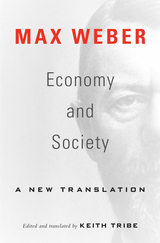
The definitive new translation of Max Weber’s classic work of social theory—arguably the most important book by the foremost social theorist of the twentieth century.
Max Weber’s Economy and Society is the foundational text for the social sciences of the twentieth and twenty-first centuries, presenting a framework for understanding the relations among individual action, social action, economic action, and economic institutions. It also provides a classification of political forms based upon “systems of rule” and “rulership” that has shaped debate about the nature and role of charisma, tradition, legal authority, and bureaucracy.
Keith Tribe’s major new translation presents Economy and Society as it stood when Weber died in June 1920, with three complete chapters and a fragment of a fourth. One of the English-speaking world’s leading experts on Weber’s thought, Tribe has produced a uniquely clear and faithful translation that balances accuracy with readability. He adds to this a substantial introduction and commentary that reflect the new Weber scholarship of the past few decades.
This new edition will become the definitive translation of one of the few indisputably great intellectual works of the past 150 years.
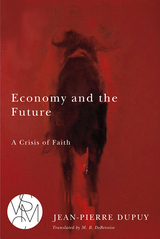
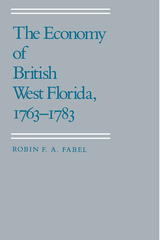
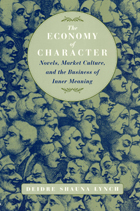
Although the story of this shift is usually told in terms of the "rise of the individual," Deidre Shauna Lynch proposes an ingenious alternative interpretation. Elaborating a "pragmatics of character," Lynch shows how readers used transactions with characters to accommodate themselves to newly commercialized social relations. Searching for the inner meanings of characters allowed readers both to plumb their own inwardness and to distinguish themselves from others. In a culture of mass consumption, argues Lynch, possessing a belief in the inexpressible interior life of a character rendered one's property truly private.
Ranging from Defoe and Smollett to Burney and Austen, Lynch's account will interest students of the novel, literary historians, and anyone concerned with the inner workings of consumer culture and the history of emotions.
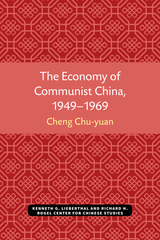

The authors present the first detailed economic analysis of the Palestinian uprising, showing how the unrest has led to a fall in Arab employment in Israel and serious economic loss to the occupied territories with some loss to Israel. They also examine how the uprising has affected Israel's financial standing internationally and the inflow of foreign aid.
Razin and Sadka see promise for Israel's economy in the waves of immigration from the former Soviet Union, despite the current difficulties in absorbing the immigrants; in the coexistence of a flourishing and highly competitive private sector with a relatively large public sector, which is undergoing privatization; and in a tax structure that encourages long-term saving and business growth. By examining the interplay between the exchange rate, interest rates, and monetary and anti-inflation policies, the authors investigate the possibilities for renewed growth and conclude that the future of Israel's economy crucially depends on serious efforts to secure peace in the Middle East.

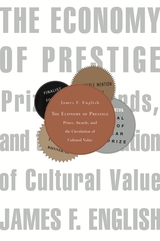
This is a book about one of the great untold stories of modern cultural life: the remarkable ascendancy of prizes in literature and the arts. Such prizes and the competitions they crown are almost as old as the arts themselves, but their number and power--and their consequences for society and culture at large--have expanded to an unprecedented degree in our day. In a wide-ranging overview of this phenomenon, James F. English documents the dramatic rise of the awards industry and its complex role within what he describes as an economy of cultural prestige.
Observing that cultural prizes in their modern form originate at the turn of the twentieth century with the institutional convergence of art and competitive spectator sports, English argues that they have in recent decades undergone an important shift--a more genuine and far-reaching globalization than what has occurred in the economy of material goods. Focusing on the cultural prize in its contemporary form, his book addresses itself broadly to the economic dimensions of culture, to the rules or logic of exchange in the market for what has come to be called "cultural capital." In the wild proliferation of prizes, English finds a key to transformations in the cultural field as a whole. And in the specific workings of prizes, their elaborate mechanics of nomination and election, presentation and acceptance, sponsorship, publicity, and scandal, he uncovers evidence of the new arrangements and relationships that have refigured that field.
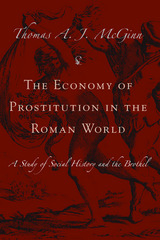
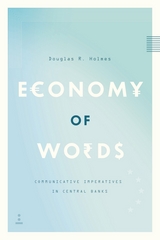
Holmes examines the New York District Branch of the Federal Reserve, the European Central Bank, Deutsche Bundesbank, and the Bank of England, among others, and shows how officials there have created a new monetary regime that relies on collaboration with the public to achieve the ends of monetary policy. Central bankers, Holmes argues, have shifted the conceptual anchor of monetary affairs away from standards such as gold or fixed exchange rates and toward an evolving relationship with the public, one rooted in sentiments and expectations. Going behind closed doors to reveal the intellectual world of central banks,Economy of Words offers provocative new insights into the way our economic circumstances are conceptualized and ultimately managed.
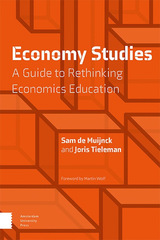

This issue theorizes what questions of value might contribute to our understanding of sound and music. Divesting sound and music from notions of intrinsic value, the contributors follow various avenues through which sound and music produce value in and as history, politics, ethics, epistemology, and ontology. As a result, the very question of what sound and music are—what constitutes them, as well as what they constitute—is at stake. Contributors examine the politics of music and crowds, the metaphysics of sensation, the ecological turn in music studies, and the political resistance inherent to sound; connect Karl Marx to black music and slave labor; look at Marx, the Marx Brothers, and fetishism; and explore the tension between the voice of the Worker who confronts Capital head-on and the voices of actual workers.
Contributors: Amy Cimini, Bill Dietz, Jairo Moreno, Rosalind Morris, Ana María Ochoa Gautier, Ronald Radano, Gavin Steingo, Peter Szendy, Gary Tomlinson, Naomi Waltham-Smith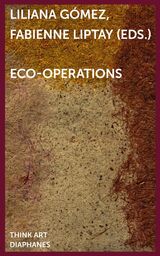
The climate change crisis has become part of aesthetic discourse and critical research in culture and the arts. Future-oriented, ecologically conceived possibilities for action are being explored by artists, curators, and scholars alike. eco-operations addresses these emerging aesthetic ecologies and new technologies of cooperation that both challenge and shape a sustainable future, foregrounding interruptions, ruptures, disconnections, dissonances, exclusions, and allochronism. Moving beyond the concepts of “flow” and “network” as a single, coherent (ecological or technological) system, eco-operations instead emphasizes the frictions within asynchronously running systems. The infrastructures and formats of artistic production and exhibition play a central role here, as they themselves constitute ecosystems that invite and regulate processes of sharing and exchange. Artists and activists are embedded in these ecosystems, in which they simultaneously intervene when searching for alternative ways of creating collaborative practice. Bringing together scholars, artists, writers, and curators, and working across a range of disciplines, eco-operations explores this field of tension between global and local ecologies and aims to speculate on where dissonances imply both creative potential and political challenges.
eco-operations features contributions by Dalida María Benfield, Ursula Biemann, Lisa Blackmore, Mateo Chacón Pino, Lucrezia Cippitelli, T. J. Demos, Sandra Frimmel, Laura Flórez, Lorena Cely, Alexandra Gelis, Liliana Gómez, Fabienne Liptay, Uriel Orlow, and Dorota Sajewska.
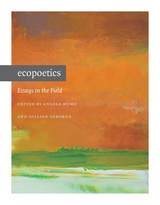
Ecopoetics: Essays in the Field makes a formidable intervention into the emerging field of ecopoetics. The volume’s essays model new and provocative methods for reading twentieth and twenty-first century ecological poetry and poetics, drawing on the insights of ecocriticism, contemporary philosophy, gender and sexuality studies, black studies, Native studies, critical race theory, and disability studies, among others.
Contributors offer readings of a diverse range of poets, few of whom have previously been read as nature writers—from midcentury Beat poet Michael McClure, Objectivist poet George Oppen, and African American poets Melvin Tolson and Robert Hayden; to contemporary writers such as Diné poet Sherwin Bitsui, hybrid/ collage poets Claudia Rankine and Evelyn Reilly, emerging QPOC poet Xandria Phillips, and members of the Olimpias disability culture artists’ collective. While addressing preconceptions about the categories of nature writing and ecopoetics, contributors explore, challenge, and reimagine concepts that have been central to environmental discourse, from apocalypse and embodiment to toxicity and sustainability.
This collection of essays makes the compelling argument that ecopoetics should be read as “coextensive with post-1945 poetry and poetics,” rather than as a subgenre or movement within it. It is essential reading for any student or scholar working on contemporary literature or in the environmental humanities today.
Contributors: Joshua Bennett, Rob Halpern, Matt Hooley, Angela Hume, Lynn Keller, Petra Kuppers, Michelle Niemann, Gillian Osborne, Samia Rahimtoola, Joan Retallack, Joshua Schuster, Jonathan Skinner.
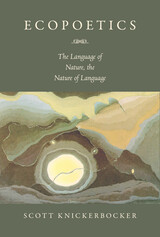
Ecopoetics probes the complex relationship between artifice and the natural world in the work of modern American poets—in particular Wallace Stevens, Elizabeth Bishop, Richard Wilbur, and Sylvia Plath. These poets relate to nature as a deep wellspring of meaning, although they all avoid using language the way most nature writers do, merely to reflect or refer directly to the world. Each of these poets, in his or her own distinct way, employs instead what Knickerbocker terms sensuous poesis, the process of rematerializing language through sound effects and other formal devices as a sophisticated response to nonhuman nature.
Rather than attempt to erase the artifice of their own poems, to make them seem more natural and thus supposedly closer to nature, the poets in this book unapologetically embrace artifice—not for its own sake but in order to perform and enact the natural world. Indeed, for them, artifice is natural. In examining their work, Knickerbocker charts a new direction for ecocriticism.
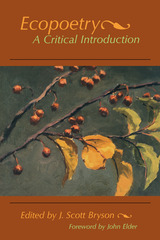
The burgeoning field of ecocriticism is beginning to address the work of such ecopoets as Gary Snyder, Mary Oliver, W. S. Merwin, and Wendell Berry, among others, whose poems increasingly deal with ecological and environmental issues. Ecopoetry: A Critical Introduction assembles previously unpublished contributions from many of the most important scholars in the field as they discuss the historical and crosscultural roots of ecopoetry, while expanding the boundaries to include such themes as genocide and extinction, the lesbian body, and post colonialism. This volume gathers these necessary voices in the emerging conversation regarding poetry’s place in the environmental debate.
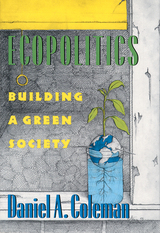
Those solutions are just "Band-Aids on a bleeding Earth," argues environmental activist Daniel A. Coleman. Where conventional wisdom sees both the cause of the environmental crisis and its cure in individual actions, Coleman says: Look again. By blaming ourselves as individuals, we let governments and corporations off the hook. Making "50 simple" changes in our personal lifestyles is worthwhile, but must not divert our attention from the underlying causes of environmental disaster. The real causes are rooted deep in the politics of human affairs-and so are their solutions.We should be asking: Why do we allow such harm to our environment? How did we create a society with no stake in the future? How can we build a green society?
The good news is that we can reverse the process of environmental abuse. Political strategies driven by the key values of ecological responsibility, participatory democracy, environmental justice, and community action are effective. Dan Coleman's stories of citizen groups whose grassroots organizing has already put ecologically sound policies in place demonstrate that the sustainable society is indeed possible.
Lucid, lively, probing, serious, yet optimistic-Coleman's analysis is required reading for all who count the earth as their home.
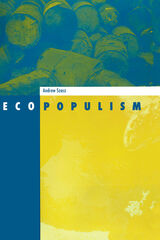
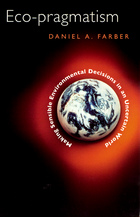
"A comprehensive well-argued effort to address many of the most difficult issues facing legislators concerned with environmental issues."—Stephen P. Adamian, Boston Book Review
"A timely and well-argued contribution."—Calestous Juma, Nature
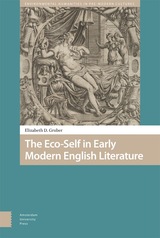
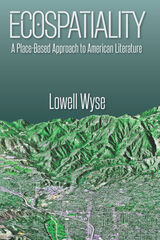
Ecospatiality explores modern and contemporary American prose literature through the lens of place, showing how authors like William Least Heat-Moon, Willa Cather, Richard Wright, and Leslie Marmon Silko represent and reimagine real places in the world and the human-environment relationships therein. Building on the work of scholars in geography, sociology, ecocriticism, and geocriticism, this book articulates the theory of ecospatiality: an understanding of place as simultaneously spatial, ecological, and historical.
In our current historical moment, which is characterized by ongoing ecological collapse and a not-unrelated increase in social disorder, few issues are more urgent than the human relationship with our environments. Whether we characterize this new epoch as the climate change era or the Anthropocene, we can no longer ignore the fact that the places we live are rapidly changing in response to economic and environmental pressures. Rather than thinking of place as a neutral site for social interaction, we should recognize how it underpins and intertwines with human experience.
Fortunately, literature can help us think through how place operates. Lowell Wyse shows that texts can be understood as works of literary cartography. Focusing on works of nonfiction and fiction whose primary settings are on the North American continent, Ecospatiality demonstrates how these narratives rely on realistic literary geography to invoke, and sometimes retell, important aspects of environmental history within particular communities and bioregions.
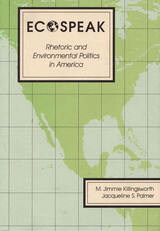
In this book, M. Jimmie Killingsworth and Jacqueline S. Palmer have a twofold purpose: to analyze the patterns of rhetoric used in written discourse about environmental politics and to make a practical contribution to the art of rhetorical criticism through the study of rhetoric in use.
The language, professional objectivity, and research programs of scientists insulate these best-informed citizens in enclaves of specialization, limiting access to crucial information and hindering effective reformative action. Science, the authors stress, is not merely a database to rely upon but a view of the world that must be broadened in order to affect social morality. Science-based activism must arise to ensure the care and future of the environment.
Killingsworth and Palmer argue that for grassroots activism to be tied to this globally conscious philosophy, a rhetoric of sustainability must be cultivated.
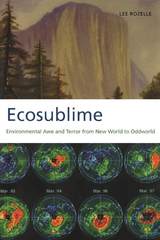
Lee Rozelle probes the metaphor of environmental catastrophe in American literature of the last 150 years. In each instance, Rozelle finds evidence that the ecosublime--nature experienced as an instance of wonder and fear--profoundly reflects spiritual and political responses to the natural world, America’s increasingly anti-ecological trajectory, and the ascendance of a post-natural landscape.
In the 19th century, Rozelle argues, Isabella Bird and Edgar Allan Poe represented the western wilderness as culturally constructed and idealized landscapes. Gardens, forests, and frontiers are conceptual frameworks that either misrepresent or uphold ecological space. Modernists like Nathanael West and William Carlos Williams, on the other hand, portray urban space as either wastelands or mythical urban gardens. A chapter on Charles W. Chesnutt and Rebecca Harding Davis analyzes a new breed of literary eco-advocate, educating and shocking mainstream readers through depictions of ecological disaster. A later chapter probes the writings of Edward Abbey and the Unabomber Manifesto to delve into the sublime dimensions of environmental activism, monkey-wrenching, and eco-terrorism.

As the twenty-first century faces a crisis of democracy and sustainability, this book attempts to bring academics and alternative globalisation activists into conversation.
Through studies of global neoliberalism, ecological debt, climate change, and the ongoing devaluation of reproductive and subsistence labour, these uncompromising essays by internationally distinguished women thinkers expose the limits of current scholarship in political economy, ecological economics, and sustainability science.
The book introduces groundbreaking theoretical concepts for talking about humanity-nature links and will be a challenging read for activists and for students of political economy, environmental ethics, global studies, sociology, women's studies, and critical geography.
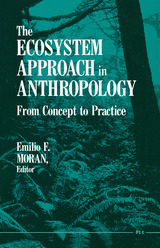

Today's natural resource managers must be able to navigate among the complicated interactions and conflicting interests of diverse stakeholders and decisionmakers. Technical and scientific knowledge, though necessary, are not sufficient. Science is merely one component in a multifaceted world of decision making. And while the demands of resource management have changed greatly, natural resource education and textbooks have not. Until now.
Ecosystem Management represents a different kind of textbook for a different kind of course. It offers a new and exciting approach that engages students in active problem solving by using detailed landscape scenarios that reflect the complex issues and conflicting interests that face today's resource managers and scientists. Focusing on the application of the sciences of ecology and conservation biology to real-world concerns, it emphasizes the intricate ecological, socioeconomic, and institutional matrix in which natural resource management functions, and illustrates how to be more effective in that challenging arena.
Each chapter is rich with exercises to help facilitate problem-based learning. The main text is supplemented by boxes and figures that provide examples, perspectives, definitions, summaries, and learning tools, along with a variety of essays written by practitioners with on-the-ground experience in applying the principles of ecosystem management.
Accompanying the textbook is an instructor's manual that provides a detailed overview of the book and specific guidance on designing a course around it. Download the manual here.
Ecosystem Management grew out of a training course developed and presented by the authors for the U.S. Fish and Wildlife Service at its National Training Center in Shepherdstown, West Virginia. In 20 offerings to more than 600 natural resource professionals, the authors learned a great deal about what is needed to function successfully as a professional resource manager. The book offers important insights and a unique perspective dervied from that invaluable experience.
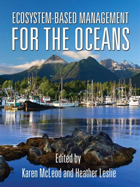
At its core, ecosystem-based management (EBM) is about acknowledging connections. Instead of focusing on the impacts of single activities on the delivery of individual ecosystem services, EBM focuses on the array of services that we receive from marine systems, the interactive and cumulative effects of multiple human activities on these coupled ecological and social systems, and the importance of working towards common goals across sectors. Ecosystem-Based Management for the Oceans provides a conceptual framework for students and professionals who want to understand and utilize this powerful approach. And it employs case studies that draw on the experiences of EBM practitioners to demonstrate how EBM principles can be applied to real-world problems.
The book emphasizes the importance of understanding the factors that contribute to social and ecological resilience —the extent to which a system can maintain its structure, function, and identity in the face of disturbance. Utilizing the resilience framework, professionals can better predict how systems will respond to a variety of disturbances, as well as to a range of management alternatives. Ecosystem-Based Management for the Oceans presents the latest science of resilience, while it provides tools for the design and implementation of responsive EBM solutions.
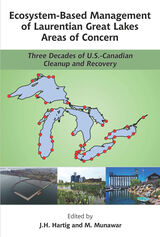
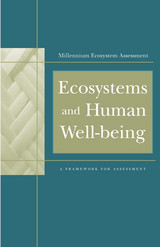
Ecosystems and Human Well-being is the first product of the Millennium Ecosystem Assessment (MA), a four-year international work program designed to meet the needs of decision-makers for scientific information on the links between ecosystem change and human well-being. The Millennium Ecosystem Assessment is modeled on the Intergovernmental Panel on Climate Change (IPCC) and will provide information requested by governments, through four international conventions, as well as meeting needs within the private sector and civil society. Ecosystems and Human Well-being offers an overview of the assessment, describing the conceptual framework that is being used, defining its scope and providing a baseline of understanding that all participants need to move forward.
The Millennium Ecosystem Assessment focuses on how humans have altered ecosystems, and how changes in ecosystems have affected human well-being. The assessment also evaluates how ecosystem changes may affect people in future decades and what responses can be adopted at local, national, or global scales to improve ecosystem management and thereby contribute to human well-being and poverty alleviation. The assessment was launched by United Nations Secretary-General Kofi Annan in June 2001, and the primary assessment reports will be released by Island Press in 2005.
The Millennium Ecosystem Assessment series is an invaluable new resource for professionals and policy-makers concerned with international development, environmental science, environmental policy, and related fields. It will help both in choosing among existing options and in identifying new approaches for achieving integrated management of land, water, and living resources while strengthening regional, national, and local capacities. The Millennium Ecosystem Assessment series will also improve policy and decision-making at all levels by increasing collaboration between natural and social scientists, and between scientists and policy-makers. Ecosystems and Human Well-being is an essential introduction to the program.
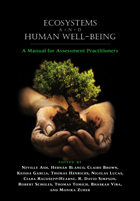
The manual is a stand-alone “how to” guide to conducting assessments of the impacts on humans of ecosystem changes. In addition, assessment practitioners who are looking for guidance on particular aspects of the assessment process will find individual chapters of this manual to be useful in advancing their understanding of best practices in ecosystem assessment. The manual builds on the experiences and lessons learned from the Millennium Ecosystem Assessment global and sub-global assessment initiatives, with chapters written by well-known participants in those initiatives. It also includes insights and experiences gained from a wider range of ecosystem service-focused assessment activities since the completion of the MA in 2005.
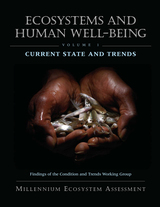
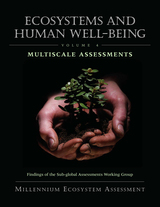
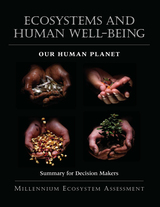
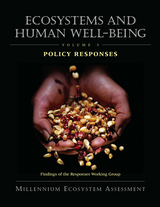
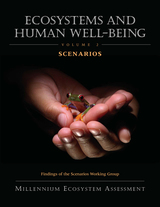
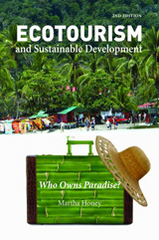
Ecotourism and Sustainable Development, originally published in 1998, was among the first books on the subject. For years it has defined the debate on ecotourism: Is it possible for developing nations to benefit economically from tourism while simultaneously helping to preserve pristine environments? This long-awaited second edition provides new answers to this vital question.
Ecotourism and Sustainable Development is the most comprehensive overview of worldwide ecotourism available today, showing how both the concept and the reality have evolved over more than twenty-five years. Here Honey revisits six nations she profiled in the first edition—the Galapagos Islands, Costa Rica, Tanzania, Zanzibar, Kenya, and South Africa—and adds a fascinating new chapter on the United States. She examines the growth of ecotourism within each country’s tourism strategy, its political system, and its changing economic policies. Her useful case studies highlight the economic and cultural impacts of expanding tourism on indigenous populations as well as on ecosystems.
Honey is not a “travel writer.” She is an award-winning journalist and reporter who lived in East Africa and Central America for nearly twenty years. Since writing the first edition of this book, she has led the International Ecotourism Society and founded a new center to lead the way to responsible ecotourism. Her experience and her expertise resonate throughout this beautifully written and highly informative book.
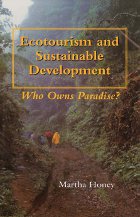


Whit Gibbons and Anne R. Gibbons’s Ecoviews Too: Ecology for All Seasons is based on the popular weekly column “Ecoviews,” published by numerous newspapers for more than thirty years. A follow-up to Ecoviews: Snakes, Snails and Environmental Tales, this lively and entertaining book provides a fascinating and thought-provoking look at the ecology of animals, plants, and their habitats, and promotes awareness of pressing environmental issues.
Because nature, in all its myriad and amazing manifestations, can be enjoyed all year round, this collection is conveniently divided into four sections paralleling the seasons and tracking the adaptations and responses of wildlife to the relentless changes that occur at any location over time. The ecological vignettes focus on seasonal happenings in the cycle of life. The authors not only draw parallels between the natural world and human activities but also highlight unique behaviors of various plant and animal species. They often use humor to get across their message regarding the need to protect our native species and the habitats they depend on for survival.
An intriguing and captivating publication, Ecoviews Too is comprised of fifty informative essays that address ecological topics such as camouflage and mimicry, hibernation and estivation, the human need to encounter scary animals, the mysteries of plant dormancy in winter, the comeback of the wild turkey coinciding with the decline of bobwhites, the chemistry behind the color change in fall leaves, and the top ten environmental problems facing the world today. Educating, entertaining, and delighting a general audience, especially those with an interest in nature, Ecoviews Too provides a useful resource for students and scientists alike.
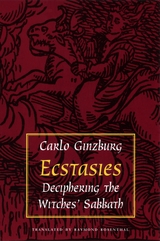
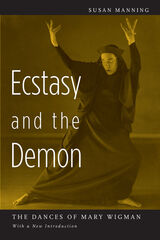

Who is a true prophet? Who has real access to divine realms of knowledge? Early Christian communities accused each other’s prophets of madness and of making false claims to divine knowledge. This book argues that early Christians did not seek to answer questions about true prophecy or to define madness and rationality, but rather used this discourse in order to control knowledge, to establish their own authority, and to define Christian identity. Christians launched these arguments in the context of the Greco-Roman world, where prophecy, visions, ecstasy, and dreams—all considered part of the same phenomenon—were the subject of cutting-edge philosophical, medical, and even political debates.
Early Christian prophecy has usually been interpreted according to a model which explains that at its origins, Christianity was characterized by vibrant spiritual gifts which declined as church order and institutions developed. Arguing that a model of struggle informed by feminist theory and postcolonial criticism provides a better framework for understanding early Christian texts, this work clarifies how early Christian arguments about rationality, madness, and the role of spiritual gifts in history are attempts to negotiate authority and to define religious identity in the midst of many competing forms of Christianity. Laura Nasrallah uses New Testament and early third-century texts to trace the rhetoric of this debate—rhetoric that is still alive today as communities across the globe struggle to define religious identity.
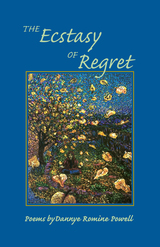
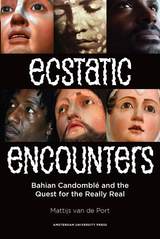
For over a hundred years, writers, artists, anthropologists and tourists have travelled to Bahia, Brazil, in search of the spirit possession cult called Candomblé. Thus, successive generations of cultists have seen a long, steady stream of curious outsiders coming to their temples with notebooks and cameras, questions and inquisitive gazes, or ogling eyes and the hope of inclusion. This study asks what seduced these outsiders to seek access to the Afro-Brazilian religious universe and, conversely, how did cultists respond to the overwhelming interest in their creed and to becoming an object of the outsiders’ imaginations.
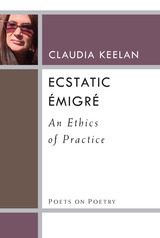
Ecstatic Émigré pays homage to poets from Thoreau and Whitman to Alice Notley, all of whom share a commitment to living and writing in the moment. Keelan asks the same questions about the growth of flowers or the meaning of bioluminescence as she does about the poetics of John Cage or George Oppen. Her originality is grounded by the ways in which she connects poetic principles with the spiritual concepts of via negativa demonstrated both in St. John of the Cross and Mahayana Buddhism. In addition, her essays demonstrate an activist spirit and share a commitment to the passive resistance demonstrated in Martin Luther King, Jr.’s concept of the “beloved community” and philosopher Simone Weil’s dedication to “exile.”
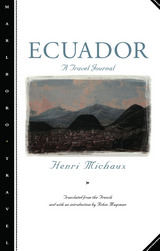

The voices and creations of Ecuadorian politicians, writers, artists, scholars, activists, and journalists fill the Reader, from José María Velasco Ibarra, the nation’s ultimate populist and five-time president, to Pancho Jaime, a political satirist; from Julio Jaramillo, a popular twentieth-century singer, to anonymous indigenous women artists who produced ceramics in the 1500s; and from the poems of Afro-Ecuadorians, to the fiction of the vanguardist Pablo Palacio, to a recipe for traditional Quiteño-style shrimp. The Reader includes an interview with Nina Pacari, the first indigenous woman elected to Ecuador’s national assembly, and a reflection on how to balance tourism with the protection of the Galápagos Islands’ magnificent ecosystem. Complementing selections by Ecuadorians, many never published in English, are samples of some of the best writing on Ecuador by outsiders, including an account of how an indigenous group with non-Inca origins came to see themselves as definitively Incan, an exploration of the fascination with the Andes from the 1700s to the present, chronicles of the less-than-exemplary behavior of U.S. corporations in Ecuador, an examination of Ecuadorians’ overseas migration, and a look at the controversy surrounding the selection of the first black Miss Ecuador.

One hundred and sixty invited scholars and specialists—both Protestant and Roman Catholic—and 2000 other clergy and lay people took part in the historic colloquium sponsored by the Harvard Divinity School in 1963 as a Protestant response to the Second Vatican Council. This volume includes the Stillman Lectures on the Unity of Christians given by Augustin Cardinal Bea, President of the Vatican Secretariat for Promoting Christian Unity as well as all the other major addresses and proceedings of the colloquium.
In the words of Richard Cardinal Cushing, “The spirit of Christian love which could be felt in every session, along with the distinguished company of scholars which the University had assembled from far and near, guaranteed that these days would be so memorable as to demand an accessible and enduring record. We now have just such a record in these pages.” Encompassing a wide range of religious convictions, this topical and exciting book provides an illuminating perspective on the problems involved in the ecumenical dialogue and helps to define the vital issues that continue to divide Christians today.
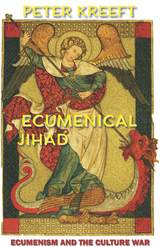
Aware of the deep theological differences of these monotheistic faiths, Kreeft calls for a moratorium on our polemics against one another so that we can form an alliance to fight together to save Western civilization.

Contemporary ecumenism is a revival of a Reformation ideal. The Colloquy of Poissy was the last great expression expression of that ideal. At the colloquy, held in 1561 on the eve of the French religious wars, revived Catholicism and emergent international Protestantism met in an attempt to establish peace, unity, and reconciliation of differing viewpoints. A history of this great conference reveals how unfinished was the Reformation and how tragic a turn it had taken.
This work on the colloquy presents the dialectical complexities of the sixteenth-century theology—a theology that had emerged with binding strands of religious idealism and political interest. Theology was, indeed, the medium of discourse, but it was not an end in itself. Rather, it was a means to a higher goal: religious reconciliation.
The present analysis, therefore, is not so much a study in the abstractions of theology as it is a study in ecumenism. Poissy is placed in a larger historical background and the author carefully and critically weighs all factors which affected the chances for religious unity. Within this larger context, he argues that the colloquy placed the participants at the final crossroads of the Reformation. When it was over the Reformation was sealed and the Counter-Reformation signaled.
Donald Nugent’s approach is revisionist; his theological orientation is Erasmian, ecumenical, and speculative. He shows that ecumenism has been effectively and banefully excised from historiography and argues that it must be reintegrated into the story of the Reformation. Because we live in a new age of ecumenism, the author’s insights and conclusions are especially appropriate. We have now that keen and historical dimension which cannot but help illuminate contemporary life.
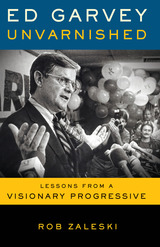
Shortly before he died, Garvey expressed his views on everything in a series of detailed, no-holds-barred interviews with journalist Rob Zaleski. In his trademark witty, blunt, and often abrasive style, he offered his impressions of the political climate, worries about the environment, and Act 10 protests on Capitol Square. Garvey's candor during these conversations provides deeper insight into the personal highs and lows he experienced over his rich life. Diehard followers will fondly remember his energetic campaigns, but they may be surprised to learn of his long-simmering disappointment after those losses. Ever timely and meaningful, Garvey's words offer a path for how the Democratic Party, both within Wisconsin and nationally, can regain its soul.

Drawing on case studies of leading schools of education, the authors offer a bold, controversial agenda for reform: ed schools must reorient themselves toward teachers and away from the quest for prestige in academe; they must also adhere to national professional standards, abandon the undergraduate education major, and reject the Ph.D. in education in favor of the Ed.D.
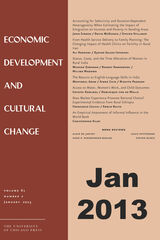


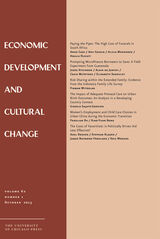
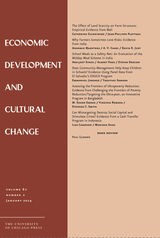


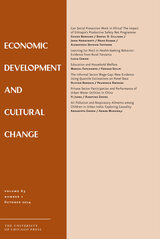



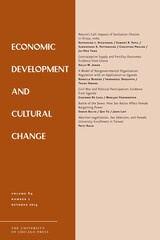
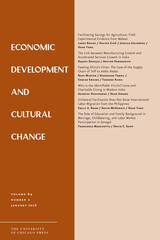

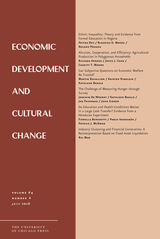
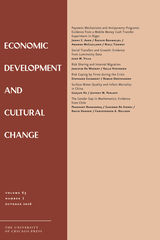


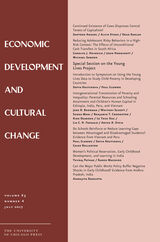




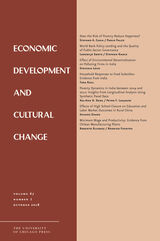






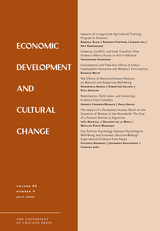


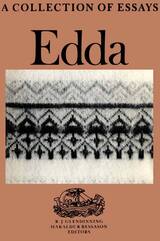

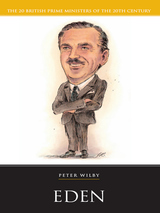

Drinking a glass of tap water, strolling in a park, hopping a train for the suburbs: some aspects of city life are so familiar that we don’t think twice about them. But such simple actions are structured by complex relationships with our natural world. The contours of these relationships—social, cultural, political, economic, and legal—were established during America’s first great period of urbanization in the nineteenth century, and Boston, one of the earliest cities in America, often led the nation in designing them. A richly textured cultural and social history of the development of nineteenth-century Boston, this book provides a new environmental perspective on the creation of America’s first cities.
Eden on the Charles explores how Bostonians channeled country lakes through miles of pipeline to provide clean water; dredged the ocean to deepen the harbor; filled tidal flats and covered the peninsula with houses, shops, and factories; and created a metropolitan system of parks and greenways, facilitating the conversion of fields into suburbs. The book shows how, in Boston, different class and ethnic groups brought rival ideas of nature and competing visions of a “city upon a hill” to the process of urbanization—and were forced to conform their goals to the realities of Boston’s distinctive natural setting. The outcomes of their battles for control over the city’s development were ultimately recorded in the very fabric of Boston itself. In Boston’s history, we find the seeds of the environmental relationships that—for better or worse—have defined urban America to this day.

Editors Melissa Homestead and Pamela Washington have gathered twelve original essays from both established and emerging scholars that set a new agenda for the study of E. D. E. N. Southworth’s works. Following an introduction by the editors, these articles are divided into four thematic clusters. The first, “Serial Southworth,” treats her fiction in periodical publication contexts. “Southworth’s Genres,” the second grouping, considers her use of a range of genres beyond the sentimental novel and the domestic novel. In the third part, “Intertextual Southworth,” the essays present intensive case studies of Southworth’s engagement with literary traditions such as Greek and Restoration drama and with her contemporaries such as Harriet Beecher Stowe and French novelist George Sand. Southworth’s focus on social issues and reform figures prominently throughout the volume, but the pieces in the fourth section, “Southworth, Marriage, and the Law,” present a sustained inquiry into the ways in which marriage law and the status of women in the nineteenth century engaged her literary imagination.
The collection concludes with the first chronological bibliography of Southworth’s fiction organized by serialization date rather than book publication. For the first time, scholars will be able to trace the publication history of each novel and will be able to access citations for lesser-known and previously unknown works.
With its fresh approach, this volume will be of great value to students and scholars of American literature, women’s studies, and popular culture studies.
MELISSA J. HOMESTEAD is the Susan J. Rosowski Associate Professor of English at the University of Nebraska–Lincoln. Her book American Women Authors and Literary Property, 1822–1869 includes Southworth, and her articles on American women’s writing have been published in a variety of academic journals.
PAMELA T. WASHINGTON is Professor of English and former dean of the College of Liberal Arts at the University of Central Oklahoma. She is the co-author of Fresh Takes: Explorations in Reading and Writing: A Freshman Composition Text.

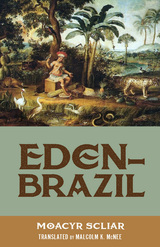

The life of Edgar Allan Poe (1809–49) is the quintessential writer’s biography—great works arising from a life of despair, poverty, alcoholism, and a mysterious solitary death. It may seem like a cliché now, but it was Poe who helped shape this idea in the popular imagination. Despite or perhaps even inspired by his many hardships, Poe wrote some of the most well-known poems and intricately crafted stories in American literature. In Edgar Allan Poe,Kevin J. Hayes argues that Poe’s work anticipated many of the directions Western thought would take in the century to come, and he identifies links between Poe and writers and artists such as Walter Benjamin, Salvador Dalí, Sergei Eisenstein, and Jean Cocteau.
Whereas previous biographers have tended to concentrate on the sorry details of Poe’s life, by contrast Hayes takes an original approach by examining Poe’s life within the context of his writings. The author offers fresh, insightful readings of many of Poe’s short stories, and presents newly-discovered information about previously unknown books from Poe’s library, as well as updated biographical details obtained from nineteenth-century newspapers and magazines. This well-researched biography goes beyond previous scholarship and creates a complete picture of Poe and his significant body of work.
Approachably written, Edgar Allan Poe will appeal to the many fans of Poe’s work—from “The Raven” to the “Tell-Tale Heart”—as well as readers interested in American literary history.

Edgar Allan Poe - American Writers 89 was first published in 1970. Minnesota Archive Editions uses digital technology to make long-unavailable books once again accessible, and are published unaltered from the original University of Minnesota Press editions.
READERS
Browse our collection.
PUBLISHERS
See BiblioVault's publisher services.
STUDENT SERVICES
Files for college accessibility offices.
UChicago Accessibility Resources
home | accessibility | search | about | contact us
BiblioVault ® 2001 - 2024
The University of Chicago Press





